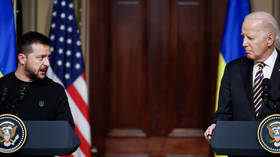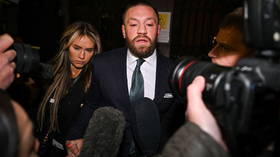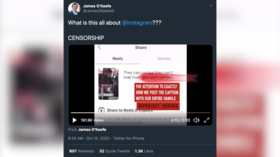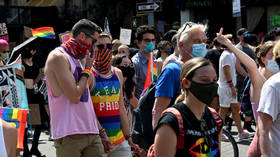White farmer’s brutal murder sends protesters & counter-protesters to rally outside courthouse in South Africa
Tensions ran high as two groups of protesters squared off after a young white farmer was killed in South Africa. The case has reignited the decades-old conflict surrounding land ownership in the country.
Local farmers and their supporters rallied outside a courthouse in the town of Senekal, demanding justice for farm manager Brendin Horner, 21, who was brutally murdered earlier this month. Some wore T-shirts saying “Stop farm murders, enough is enough,” to highlight what they see as a string of violence against white farmers in the country.
Farmers have gathered in prayer ahead of the planned demonstrations as two suspects accused of murdering farm manager Brendin Horner appear in court. Watch: https://t.co/koLx8SZysr#Newzroom405pic.twitter.com/RS4UIDo5mx
— Newzroom Afrika (@Newzroom405) October 16, 2020
There was heavy police presence in the area and officers set up impromptu checkpoints to inspect vehicles heading for Senekal.
Hundreds of red-clad activists from the opposition Economic Freedom Fighters (EFF) party also descended on the Free State town.
Fighters have descended on the Senekal soil, in numbers. The sole mission is to protect the police and state property. No white farmer should burn a police van and fire shots inside court premises ever again. Not on our watch. Police were humiliated by white farmers last week pic.twitter.com/QtAZaizaOf
— EFF BCM Region (@BcmEFF) October 16, 2020
Some of them reportedly used an Apartheid-era chant, calling to “kill the Boer, the farmer,” referring to the descendants of white colonists.
#SpeakOut 📢In Senekal the EFF supporters started the day by singing the banned racist song, "Shoot to Kill, Kill the Boer, the Farmer" in South Africa. pic.twitter.com/ENYQrRoNOn
— Jeanette de Villiers (@devilliers98) October 16, 2020
EFF leader Julius Malema was quoted by local media as saying that the activists arrived to “protect democracy and the Constitution” in the wake of recent violence at an earlier protest. He called authorities “puppets of the white man,” and threatened to “incite the civil arrest” if police failed to act against those responsible for causing chaos during the previous rally outside the court.
On October 6, enraged farmers stormed the courthouse, demanding the suspects in the Horner murder to be handed over to them. They turned over a police car and set it on fire. One protester was arrested and later charged with attempted murder and inciting violence for allegedly firing his gun in court.
Whites don't play; they are dealing with this clownish government of their puppet @CyrilRamaphosa. No single rubber bullet shot. Can you imagine if it was black people? pic.twitter.com/iGy1NBsrv3
— Julius Sello Malema (@Julius_S_Malema) October 6, 2020
Horner’s body was discovered tied to a pole with a rope around his neck on October 2. A knife was seized from the crime scene and bloodstains were found in his car. Two black suspects, 32 and 44, were detained, with blood-stained clothes found at the scene of the arrest. Police Minister Bheki Cele said that the pair were serial livestock thieves, and one of them was a known felon who had been arrested 16 times in the past. The suspects’ families, meanwhile, insist that the men were at home when the crime happened.
President Cyril Ramaphosa called Horner’s killing “an appalling act of cruelty” that should “anger and upset every one of us.” At the same time, he condemned the riots and said that while crime affects everyone, it is “young black men and women who are at a disproportionately greater risk of being murdered.”
Ramaphosa urged everyone to follow the law. “We must not be blinded by our own prejudices to the suffering and pain of others. It should not matter to us if the victim of violent crime is black or white.”
Also on rt.com ‘Boer Lives Matter’: South African farmers storm court where two men held over murder of white farm workerThe violence over farms has been a highly-contentious issue since Apartheid regime was scrapped in the early 1990s. White farmer communities, who owned the vast majority of the land during Apartheid, say that they are victims of regular attacks and intimation by pro-government groups who seek to grab their land. Black activists, meanwhile, claim that the redistribution of land would lead to historical justice for the nation’s indigenous population.
Think your friends would be interested? Share this story!














